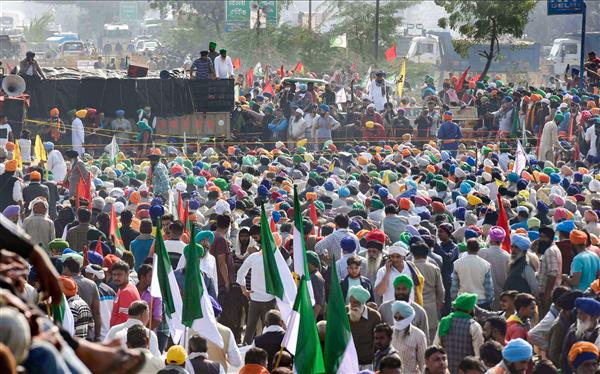DESIBUZZCanada
Events Listings
Dummy Post

International Day Of Yoga To Be Virtually Celebrated Saturday At 4pm

CANCELLED: Coronavirus Fears Kills Surrey’s Vaisakhi Day Parade

ADVERTISE WITH US: DESIBUZZCanada Is The Most Read South Asian Publication Online

SURREY LIBRARIES: Get Technology Help At Surrey Libraries

WALLY OPPAL: Surrey Police Transition Update On Feb. 26

GONE ARE THE DAYS - Feature Documentary Trailer

Technology Help At Surrey Libraries

Birding Walks

Plea Poetry/short Story : Youth Contest

International Folk Dancing Drop-in Sessions
TOTAL REPEAL: India’s Unjust And Carelessly Designed Farm Laws Need Total Demolition
- January 14, 2021

In the middle of one September night, three farm bills got introduced and passed into laws with the show of "yes" hands, no debate, no discussion. In its mood to privatize the agricultural economy, the menacing laws allow:
1. Private corporations to purchase crops at market prices (as opposed to the ones set by the government),
2. Give corporations the power to stockpile commodities in unlimited quantities,
3. Allow corporations to engage in contract farming without proper legal recourse for farmers in the event of a dispute.
By Promod Puri
When an entire structure has a fragile foundation, a shaky frame, and is dangerous to live in, it needs a total demolition immediately.
That is precisely the situation with hastily and carelessly constructed farm laws that, instead of benefiting the farmers, would be disasters for them not in the far-off future but right away when the next crops hit the market.
The structure of the authoritarian regime of Modi built is illegal and unauthorized. It did not go through the proper democratic and parliamentary formalities and procedures of the Indian parliament.

In the middle of one September night, three farm bills got introduced and passed into laws with the show of "yes" hands, no debate, no discussion. In its mood to privatize the agricultural economy, the menacing laws allow:
1. Private corporations to purchase crops at market prices (as opposed to the ones set by the government),
2. Give corporations the power to stockpile commodities in unlimited quantities,
3. Allow corporations to engage in contract farming without proper legal recourse for farmers in the event of a dispute.
The three laws are interlinked; the totality of their impact is what concerns the agitating farmers. For that reason, the interpretation of this package as a whole, not by its parts, is essential.
In the first scenario, let us say the Minimum Support Price (MSP) of 100 kg of rice in any given year is Rs. 1500. The private companies move in and offer Rs.100 or 200 more. The farmer gets tempted to sell the rice to the private players. And the trend continues for a few seasons. Eventually, the traditional markets, called Mandis, will down their shutters and close, most likely permanently.
Who is left then to buy the farmers' produce?
Those will be private companies. And this is where they would dictate their price. They can lose in the first few years on entering the market, and that is all tax-deductible. But the strategy is to finish the Mandi system and then monopolize the entire procurement operation.
As the laws allow private companies to sign up contracts with individual farmers, the second scenario would bind the latter to produce and deliver an agreed-upon quantity of their produce.

MARTYR FARMERS: Over 50 people have died as part of the Indian Farmers' struggle to overturn unjust agricultural laws
There is no escape from the legal contract for whatever reason the farmer has. The private company may give some advance of money to the farmer to finalize a deal. Farmers always need money to buy the essentials to sow the seeds and raise their crops.
At the time of delivery, the price might go down due to fluctuations in the free market. The private companies can refuse to pay the agreed-upon price under one or ten excuses like the quality is low, the apparent size is small or big. They would offer a lower price, and the poor farmer would end up in a catch 22 situation.
There is no legal provision in the laws. And even if the government puts in some standard clauses, it is a dream to receive justice under the present state of affairs in the Indian legal system, especially for the poor folks in the farming community.
In the present agitation, farmers are well aware of the implications of the new farm laws. The unions leading the protest have done a tremendous job of printing and distributing over 100,000 pamphlets in Punjabi and Hindi, explaining the rules and subsequent entanglements.
In the current impasse, the farmer leadership wants no patchwork as offered by the government to fix the structure, instead of its total demolition for farmers' peace and prosperity.

Promod Pur is a veteran journalist and founder and former editor-publisher of South Asian LINK Newspaper.












